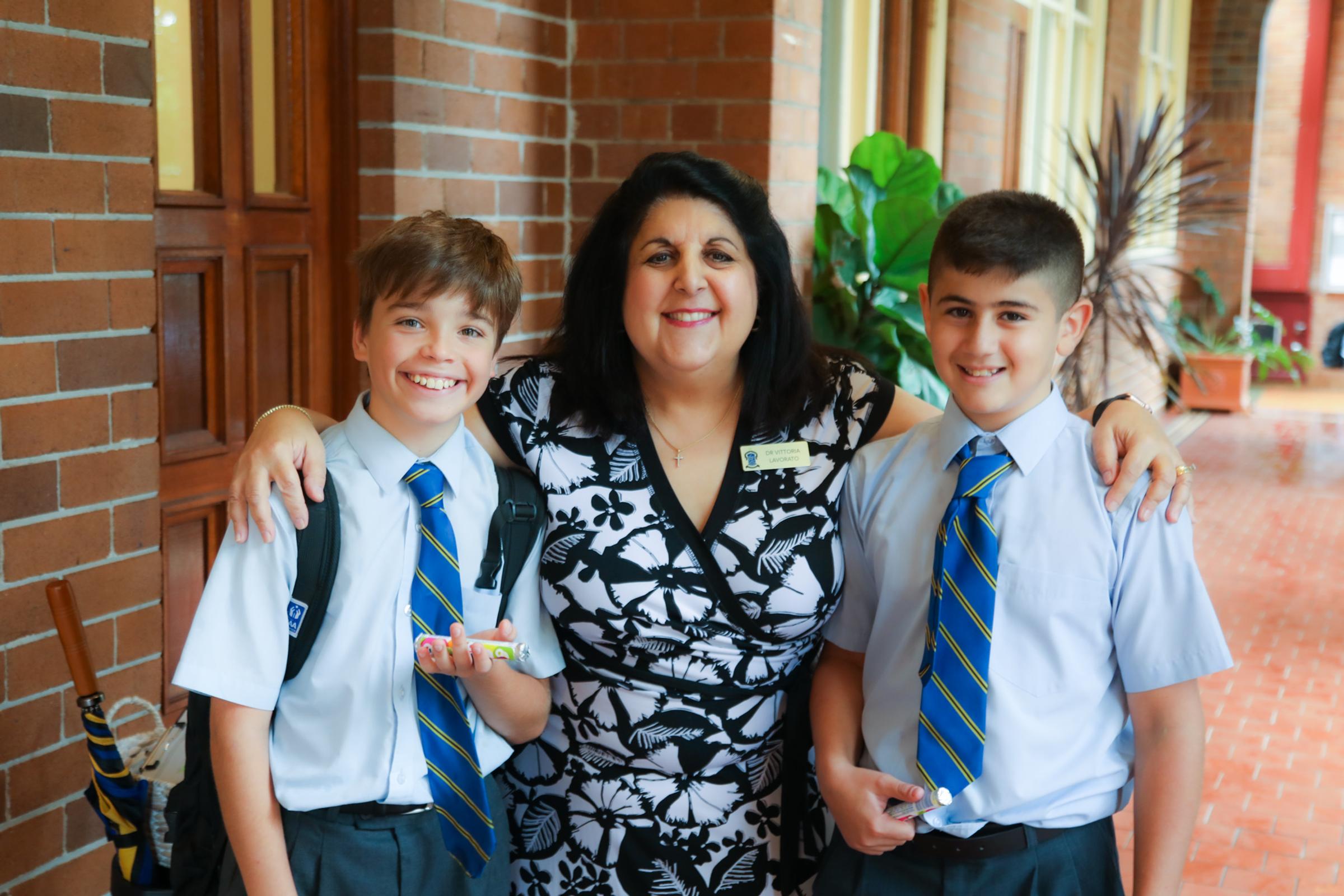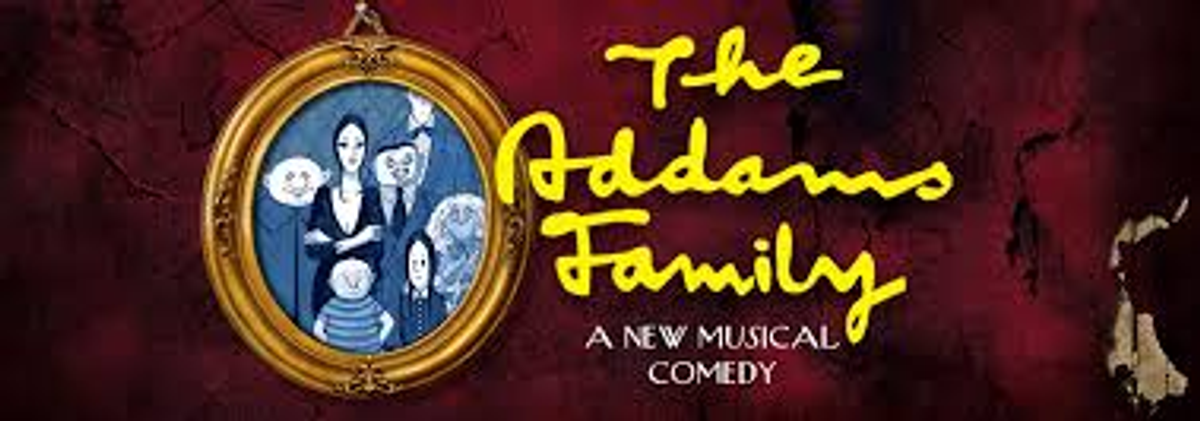Principal

The Benefits of Musical Theatre
This week, we are excited to be showcasing our 2022 SPC production of The Addams Family at the Bryan Brown Theatre in Bankstown. It has been a long and gruelling schedule of rehearsals, costume and set production. They even found time to torture me and my Leadership Team! Ms Duff will no doubt thank the cast and crew in due course. I know that if I even attempt to acknowledge people, I will omit someone who played a part in bringing this production to life.
In my article for this week, I wanted to focus on the WHY. Why bother with all of the hard work and energy?
In 2009, archaeologists unearthed a flute carved from bone and ivory that was over 35,000 years old. This proved that even during the hunting/gathering stage of human evolution, music was present and important to society. Why else take time away from survival tasks to create a musical instrument?
We know that music and theatre is pleasurable, and it seems to play a role in our wellbeing. But many researchers also believe that music plays a significant role in strengthening social bonds.
In a 2013 review of the research on music, Stefan Koelsch, music psychologist at the Freie University Berlin, described several mechanisms through which music impacts our ability to connect with one another—by impacting brain circuits involved in empathy, trust, and cooperation—perhaps explaining how it has survived in every culture of the world.
Although music can certainly be played and listened to alone, in the shower or on your iPod, it is also a powerful social magnet. After all, a music concert is one of the few times when we will gather together with thousands of other people to engage in a shared activity. There is something about listening to music, or playing it with other people, which brings its own social buzz, making you feel connected to those around you.
Here are some ways scientists believe that music strengthens social bonds.
Music increases contact, coordination, and cooperation with others
For much of human history, the only way to experience music was live—there were no recordings allowing us to share music outside of performance. Since music had to involve contact with others (e.g., coming together for a concert), it provided a net of physical and psychological safety that may have helped our early ancestors—and may still help us—to survive.
Performing music involves coordinating of our efforts too, at least if we want to produce a pleasing sound. According to researchers, when we try to synch with others musically—keeping the beat or harmonising, for example—we tend to feel positive social feelings towards those with whom we’re synchronising, even if that person is not visible to us or not in the same room. Though it’s unclear exactly why that happens, coordinating movement with another person is linked to the release of pleasure chemicals (endorphins) in the brain, which may explain why we get those positive, warm feelings when we make music together.
Playing music in a band or singing in a choir certainly involves cooperation as well—whether in preparation for the performance or during the performance. Arguably, cooperation increases trust between individuals and increases one’s chances of future cooperation—important factors in human evolutionary success and societal stability.
Music gives us an oxytocin boost
In a study with humans, singing for 30 minutes was shown to significantly raise oxytocin levels in both amateur and professional singers, regardless of how happy or unhappy the experience made them. Perhaps this explains why new mothers often sing lullabies to their newborn babies: it may help encourage bonding through oxytocin release.
Researchers have also found that listening to music releases oxytocin. In one study, patients undergoing coronary bypass surgery were asked to listen to experimenter-selected ‘soothing’ music for 30 minutes one day after surgery. When tested later, those who’d listened to music had higher levels of serum oxytocin compared to those who were assigned to bed rest alone. Though the study was more focused on the relaxation properties of music than on oxytocin specifically, it still suggests that music directly impacts oxytocin levels, which, in turn, affect our ability to trust and act generously toward others—factors that increase our social connection.
Music strengthens our “theory of mind” and empathy
Music has been shown to activate many areas of the brain, including the circuit that helps us to understand what others are thinking and feeling, and to predict how they might behave—a social skill scientists call “theory of mind,” which is linked to empathy.
In one study, Koelsch and a colleague hooked up participants to an MRI machine and had them listen to a piece of music that they were told was either composed by a human or by a computer (even though it was actually the same piece of music). When participants listened to music they believed was composed by a human, their “theory of mind” cortical network lit up, while it didn’t under the computer condition. This suggests that our brain doesn’t just process sound when we hear music, but instead tries to understand the intent of the musician and what’s being communicated.
In a more recent study, a group of primary-school-aged children were exposed to musical games with other children for one hour a week over the course of an academic year, while two control groups of same-aged children received either no games or games with the same purpose but involving drama or storytelling instead of music. All of the children were given various empathy measures at the beginning and end of the year; but only the music group significantly increased their empathy scores, suggesting that music may have played a pivotal role in their empathy development.
Music increases cultural cohesion
Think of a favourite lullaby or children’s song passed down through the generations, or of crowds listening to the national anthem at a baseball game. Music is one way of communicating belonging, which may increase your sense of safety and obligation toward your group.
When we discover that someone likes a piece of music that we like, we tend to think better of them—as if musical preference had a deeper meaning than just entertainment. In fact, studies have shown that people affiliate musical taste with holding certain values, and that this assumed connection between music and values influences how much we think we’ll like someone based on their musical tastes.
Music also influences how we think others will get along. In one recent study, participants listened to music or to silence while they watched videotapes in which three people were seen walking either in step or out of step with one another. When asked to rate levels of rapport and sense of unity among the three walkers in both conditions, the participants who listened to music perceived a greater rapport and unity among the walkers than those participants who didn’t listen to music. This suggests that music somehow strengthens our perception of social cohesion among people, perhaps through mistaking our own feelings for those of the people we observe.
Studies find that social cohesion is higher within families and among peer groups when young people listen to music with their family members or peers, respectively. This effect is true even in cultures where interdependence is less valued, pointing to music’s potential to act as “social glue” that binds people together. You only have to turn up to a Supporters’ Day at the College to hear our war cries and the effect it has on bonding the boys together and lifting the performance of the athletes.
Of course, sometimes these effects can backfire. For example, some have argued that music—specifically the music of Wagner in early 20th century Germany—played a role in Hitler’s propaganda machine, uniting people emotionally for a hideous political agenda. This reveals the degree to which human bonding can sometimes result in exclusion or even aggression toward out-groups—a tendency that we must continually guard against.
In fact, music works a lot like language does—except instead of words and ideas, emotions and intent are communicated. In this way, music, like language, can be passed on from generation to generation, creating a sense of continuity and loyalty to one’s tribe.
Nowadays, music has the potential to make us feel connected to all of humanity. The more we use music to bring us together—literally and figuratively—the more potential for increased empathy, social connection, and cooperation. I, for one, feel more connected to my human ancestors just knowing that someone took the time to carve that flute, succumbing to the primal urge to make music. It’s an urge I share. Perhaps we all do.
Staff Changes
At the end of this week, we farewell Ms Kylie Hinkley from the English Faculty and Mr Richie Chacon as the Director of Business Services.
We wish them both well as they move into different schools. Mr Chacon has been here for several years and has provided key linkages between our educational vision and the business functions of the College and has ensured the College is achieving its financial and operational requirements for a leading school in the 21st century.
We will be welcoming new staff to the College in the next few weeks.
- Miss Alana Rizzo will be joining the English Faculty at the start of Term 3. She is currently teaching at Abbotsleigh and will bring her expertise to the existing dynamic team.
- Miss Katherine Tripodi will be joining the TAS team, replacing Steven Roberts who finishes at the end of Week 9. Katherine will commence at the start of Week 9. She is currently a teacher at Sancta Sophia Catholic College, Box Hill and is a specialist TAS teacher with accreditation and experience in Hospitality and Food Technology.
- Ms Bernadette Watt joined the Finance Team this week as the Accounts Payable Officer. She has been doing a similar role with Sanofi for eight years and will bring her industry experience to the team.
- We have yet to finalise Mr Chacon’s replacement. In the interim, all enquiries that would usually go to him will go via Mr Adrian Byrne, our Deputy Principal. Mr Byrne will be supporting the Property Services and Facilities, Finance and ICT teams in the interim.
In Memoriam
We keep in our prayers Gianluca De Pasquale (Year 12), Daniel De Pasquale (Year 10), and Old Boys Philip De Pasquale (’19) and Jordan Foti (’21) on the recent passing of their grandfather, Mr Giovanni Bombara.
Eternal rest grant onto him O Lord and let perpetual light shine upon him.
May he rest in peace.
Amen.
Dr Vittoria Lavorato
Principal
SPC boys can do anything!
**except divide by zero

